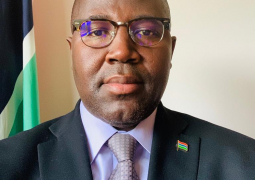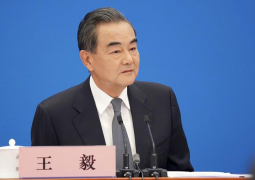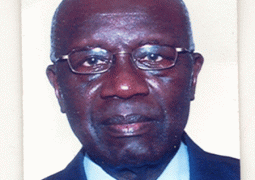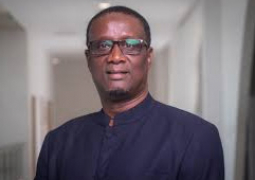Imam Tafsir Gaye was born in Banjul in 1936. With his father dying young and his mother unable to support the whole family, he was sent to attend daara in Tiwaoune as a young child. It was a hard childhood: he slept on the floor and had to beg for his food.
Shortly after he returned home from daara he lost his mother too. Most daara returnees get jobs as local Imams and oustasses, living a modest life. But he had thirsted of knowledge, and he wanted more: to learn and master Arabic, to get a college education. Alone, an orphan with no support but filled with determination, he won himself a government scholarship to study at Al Azhar University, one of the oldest and most prestigious in the World.
Egypt was a strange land, but he made it his home. Having to learn the language and survive on a measly stipend - he told us of how he would cook chu one day, then have only enough money for degeh the next, and convert the chu into domoda - he still excelled, becoming president of the student union and making many lifelong friends.
When he returned home he settled back in Banjul, starting a new family. He became an influential fixture in the religious life of the city, and established his bona fides as a respected teacher: co-founding Muslim High school, and teaching at several other schools in Banjul, including St Augustine’s and Campama. He became Deputy Imam of Banjul, and spent many years standing behind a minbarr every Friday preaching, and traveling the world with Imam Abdoulie Jobe, his great friend and mentor. For many years he worked as a Hajj guide, accompanying pilgrims to Mecca and aiding them through the performance of Islam’s fifth pillar.
These are the bare facts of his life, the stuff that will be printed in every obituary - but there is so much more, locked away in the memories of the ones who knew him, in my own memories as his son and constant companion.
Imams are the great unappreciated one-man safety nets in our communities. Though they're seldom paid an official salary, they play a great many roles: religious and spiritual leader, moral guide, social worker, therapist, marriage and grief counselor, arbitrator, the conscience of the people, and on and on.
Growing up I saw this first-hand every day. My father counseled troubled kids in high school; he fixed marriages between partners not even on speaking terms anymore; he provided services at every funeral, consoling families and performing last rites on their loved ones; he welcomed new babies into the community, naming and praying for them. He was a fixture at social gatherings all over the Greater Banjul Area, always ready to drop everything as soon as he received a call. More than once he stopped a local dispute from escalating to the police, calming down hot tempers and massaging bruised egos, bringing neighbors back together again and restoring the peace.
My father worked hard to build bonds with the Christian community, always insisting that before everything else we are Gambian first, related by our surnames. He was great friends with the late Bishop Johnson, and regularly visited the Catholic clergy. Every Sang Marie, no matter how hard it rained, he would dress up in his best clothes and wait at our street corner for the procession of Christians that celebrated the day, walking with them a part of the way and making sure he was seen by his congregants. He was amongst the delegation that welcomed the Pope on his visit to Gambia, brushing aside criticism from other Imams and pointing out that the Prophet had spent his life building bridges with non-Muslims.
Another memory: Evening, my father out on the veranda, bespectacled, scattered all about him half open books and sheets of paper, deep in thought, occasionally pausing to sip some mint tea. His “Gestu”, he called it, with pride - the Olof word meaning “research”. Without it - reading and wrestling with the ideas of other scholars - he believed no Imam could carry out their mandate, and no teacher is deserving of the name. For each 30 min khutba he gave he poured days of Gestu, filling paper after paper with his neat Arabic script.
He was happiest when surrounded by his students, involved in a back and forth with them. Every Friday after jumaa there was a standing invitation to lunch at our house for everyone who had ever passed through his classes. He would spend whole evenings in animated conversation with them, treating them as equals.
And yet, as bookish and as comfortable in the world of ideas as he was, he was also a man of great charity and public service.
For years during my childhood, every Ramadan he collected azaka from his richer taalibe, and then used it to fill a track with rice and sugar, which he dropped off at every jumaa in Banjul, for the local miskiin.
At the same time he ran a support group for the tubain, recently converted Muslims often treated as outcasts by their communities and families. Every Saturday they met at my house, and he gave his time comforting them, working with them on fundraising initiatives to help those who needed it, making them all feel loved and like part of a new family.
He did all this quietly and without any cameras - I never heard him beat his chest or show off about how many people he was benefiting.
Another memory: walking through Banjul we pass a man on the street lighting a cigarette. As soon as he sees us he flings it away. Forgive me Imam, he says, I should not be smoking in front of you. My father asks him to retrieve it - the man refuses. Walahi if you don’t I’ll take it and smoke it myself, my father tells the man with a twinkle in his eye, do you want your Imam smoking? The man laughs and picks it up, thanking him. My father prays for him, and we walked on. This was his way: quick of wit, non-judgemental, not wanting to bother anyone.
Where other Imams and preachers wielded the stick of Jahanam and eternal damnation, trying to scare you into being a good Muslim, he understood instinctively that inspiration is a better foundation for faith than terror. This instinct was his guiding light, the unifying theme in what amounted to thousands of sermons, both written and spoken, that he delivered in his life.
Once, listening to the radio together, we heard a preacher explaining how hot hell is: so hot, the man claimed, that if the heat of hell shone down on us for even a second, a kobo fish on the earth’s surface would be burnt to a char instantly, bones and all. So imagine what that will do to your body, the preacher warned. My father found this hilarious, and from then on would present it as the antithesis of everything he thought a preacher should do.
His own waareh were of a different kind. He was an accomplished storyteller, one who could present the Quran and sunnah in a way that made you feel like you were reading the best book ever written or watching the best film ever made.
It was in the way he approached translation of the Quran: while other preachers would first read an Arabic verse followed by a stiff-sounding Olof transcription, word for word, he set aside the tome and spoke in flowing, metaphorical, beautiful Olof, quoting verses and hadith from memory as needed, weaving it all deftly with Arabic poetry and Olof taalif.
His Ramadan wahtaan were legendary and attracted listeners from all over Banjul. After taakusaan, waiting for the dokk, out of energy and your throat raw with thirst, for a moment Imam Tafsir made you forget the hunger, the irritability, even the place you were in: a hot dusty jumaa in West Africa.
He transported you: one evening to the banks of the Nile as the arrogant Firr-aw-na (Pharaoh) ranked his armies against the Lord, who felled him by sending a single mosquito to enter his ear and drive him insane; another evening to the caves in which the young men sat and whiled away a day, only to come out and find a hundred years had passed; yet another evening to the battle of Badr, the Last Prophet and his Sahaaba outnumbered and outmatched yet still eking out a victory...
You could spend years in daara, learning the Quran by rote, going through the motions mechanically, bored out of your mind; and in an evening listening to him the Deen would come alive, become immediate and urgent, a warm ocean of faith that held you and everyone around you in comfortable place, and that extended back in time to an Allah-chosen man who received a message in a cave, one that had lasted a thousand years unchanged, until it reached you in that dying timiss light, from Imam Tafsir’s lips to your ears.
This was his gift.
And this was his Islam: a religion of peace and understanding, a wellspring of love around which the askan could gather for nourishment, a place where anyone could come regardless of their sin and be welcomed, be included, be made whole again.
This is why I found post-911 America’s portrayal of Islam - represented by terrorist groups and bearded jihadis - so jarring when I arrived in that country. The Deen that my father taught brooked no violence, and was so yaatu - so wide and all-encompassing - that it had room for even the most imperfect believer, the most prodigal child. It was an Islam of negotiating to a common understanding, an Islam of mending and uniting, of community service and social cohesion; a faith that exists harmoniously alongside all other faiths, firm in its moral authority yet tolerant of other worldviews. It is the Islam of Alh Malick Sy, the Sufi way my father was taught all those long years ago in his beloved Tiwaoune, that had ignited a flame in his soul which he brought home and spent the rest of his days spreading, its light so wondrous in his own life he could barely wait to share it with others, to upgrade them to its illumination.
This is the legacy of Imam Tafsir Gaye, the message that became, in the end, the resolution of his life into a final sermon, 84 years of “Gestu” delivered in a single moment.
A final memory, one of my favorite from childhood: we are all seated on a basang, and my father is finishing up a waareh, surrounded by listeners in rapt attention. He is describing what Heaven will be like for the faithful, and there is a tenderness in his voice as he speaks that makes me want to close my eyes and just listen to him... I do not remember everything he said, but I remember the way he ended: In the highest Janna, he explained, where the best people will live, this will be the final reward: every morning God Himself will come to your door and greet you by name.
I hope and pray, Gaye, that you are waking now with a smile on your face, and saying “naam” because He has called your name.
From Imran Gaye, son of late Imam Gaye





